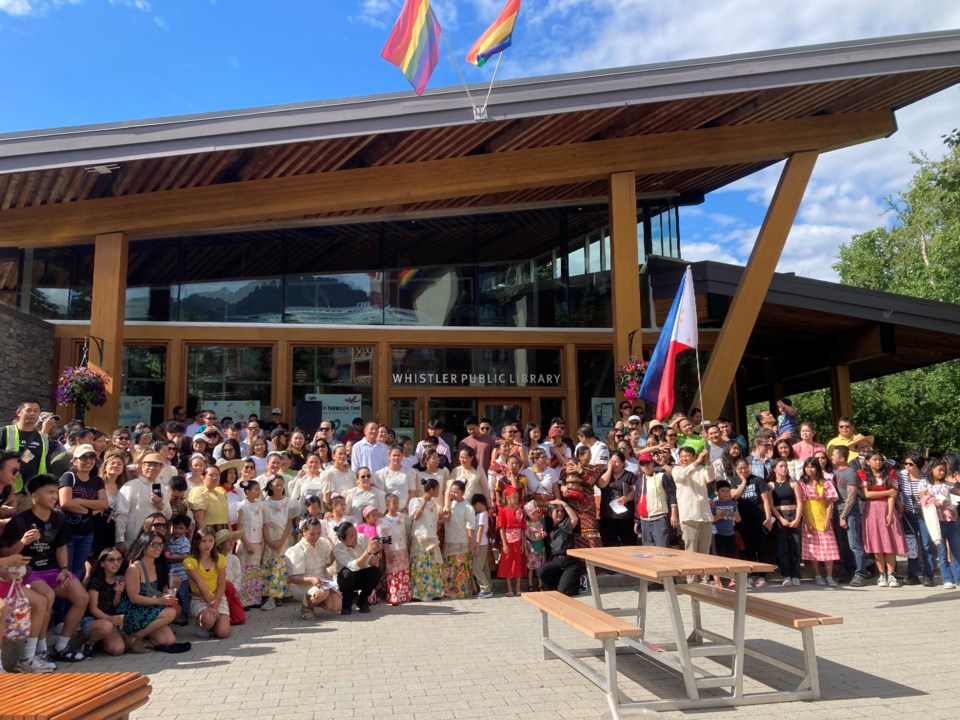On June 11, Whistler celebrated Philippines Independence Day at the local library, the first time the resort’s growing Filipino community officially marked the national holiday here.
I was surprised to learn this was the first such event here, given how integral Whistler’s Filipinos are to the community. Put bluntly, they are a major cog in the tourism machine that makes Whistler run: they cook the meals in our restaurants, prepare the guest rooms in our hotels, and make up the bands that play our bars and clubs (shout-out to musical wizards Art Barrientos and Juan del Castillo, who seem to play in nearly every band that exists across the Sea to Sky).
“Basically, this is a celebration for our freedom from Spain, but why we’re doing it in Whistler is because there is a huge community of Filipinos in Whistler, but we’ve never really gathered, we’ve never had any kind of celebration or any kind of get together of everyone that’s in the community, and there’s so many new Filipinos now who just got here in Whistler,” Hannyliz Villafuerte, who collaborated on the event with the Whistler Multicultural Society, told Pique recently.
“I’ve heard so many stories of them feeling lonely. And because everyone’s so busy, I thought of getting together, and it just so happens that it’s Philippines Independence Day, which is perfect. So then we really get to have a reason together.”
This sense of loneliness is something I’ve personally heard about anecdotally more recently than at any other point I can remember from my decade-plus in Whistler. Perhaps it’s the lingering effects of a pandemic that abruptly severed so many of our social ties. Or maybe folks have less time for friends in the post-COVID rush back to work, not to mention the rising cost of living that has locals feeling like they have to work more to make ends meet.
Whatever the root cause, there’s no question that loneliness is likely amplified if you are one of the growing number of immigrants who have landed in Whistler in recent years. According to the most recent census data, the resort’s immigrant community—which totalled 3,320 in 2021—now makes up nearly a quarter of the permanent population, at 23.7 per cent, up three percentage points from the 2016 census. That of course doesn’t capture the many people from outside of Canada who live here that aren’t permanent residents or Canadian citizens.
It’s a trend you pick up on just by listening to the growing cacophony of languages now heard around the resort. Thanks largely to my overreliance on Poparide—a ridesharing app started in Squamish—I regularly meet new Whistlerites who’ve come here from near and far, including from locales that haven’t historically turned up here in huge numbers, like Mexico, Chile, Brazil, the Czech Republic, and Morocco.
While a welcome addition to the social fabric of the resort, it’s certainly not guaranteed this increase in diversity will necessarily result in added visibility. When you’re a ski town that has been steeped in the sport’s predominantly Eurocentric culture for decades, not to mention hosting close to 3 million visitors a year from around the globe, gaining recognition is an uphill battle.
That’s what makes the Whistler Multicultural Festival—which returned June 23 for its first in-person instalment since 2019—such a vitally important addition to Whistler’s busy event calendar. Organized by the Whistler Multicultural Society, it is the only formal opportunity the community’s immigrants and newcomers have to showcase their distinct culture, traditions and history.
Featuring an array of performances that range from Brazilian capoeira to Swiss alphorn, along with a selection of informative workshops and delicious food stalls, it’s an event I’ve had the privilege of MCing a few times before—along with this month’s festival. What struck me almost instantly about the event is just how seriously everyone takes their performances. In a town where nearly everyone, from the locals to the visitors, has come from elsewhere, the opportunity to shine a light on what made you who you are comes with a deep responsibility to make the invisible, visible.
Canada has long prided itself on the multicultural mosaic that has defined our demographic makeup for generations. But I’d argue that approach doesn’t go far enough in a place like Whistler, where the component parts that define who we are can so easily be lost in a sea of visitors. That’s why an abiding curiosity and willingness to challenge assumptions is so valuable. Just as you shouldn’t judge a book by its cover, Whistler has proven time and again you can’t judge somebody by their appearance alone.




